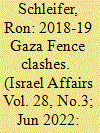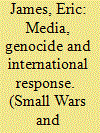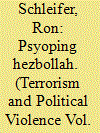| Srl | Item |
| 1 |
ID:
185263


|
|
|
|
|
| Summary/Abstract |
This article examines the violent clashes between Hamas and Israel along the Gaza Fence (30 March 2018–27 December 2019) from a psychological operations (PSYOP) perspective. It shows how Hamas managed, through a skilful combination of mass riots, media manipulation, and quick adaptation to changing circumstances to subvert the strategic priorities of the Israel Defence Forces (IDF), wear down Israeli morale, and erode Israel’s sovereignty in its southern region – all this while deterring Israel from launching a large-scale military operation in Gaza. As such, the Gaza Fence clashes provide an example of a PSYOP-based strategy that can be applied to other border conflict zones, such as Morocco, Saudi Arabia, Mexico, and Islamist insurrections.
|
|
|
|
|
|
|
|
|
|
|
|
|
|
|
|
| 2 |
ID:
080789


|
|
|
|
|
| Publication |
2008.
|
| Summary/Abstract |
This analytical article asks the question: to what degree did the media contribute to the Rwandan genocide and what might have been done about it? In examining the historical development of mass media in Rwanda, this paper argues that while hate media clearly contributed to the dynamics that led to genocide, its role should not be overstated. While it is commonly believed that hate media was a major cause of the genocide, instead it was a part of a larger social process. The use of violent discourse was at least as important as, for example, the availability of weapons in carrying out the genocide. Put another way, violent discourse was necessary but not sufficient by itself to cause the genocide of 1994. In arguing this thesis, Rwandan history is examined to demonstrate the processes of communication in the formation of destructive attitudes and behaviour. Next, analysis of the methods and content of propaganda campaigns is discussed. Finally, an overview of the requirements and organizations for third parties to conduct international communication interventions is presented in the last section
|
|
|
|
|
|
|
|
|
|
|
|
|
|
|
|
| 3 |
ID:
087763


|
|
|
|
|
| Publication |
2009.
|
| Summary/Abstract |
The 2006 War between Israel and Hezbollah had a significant component of PSYOP. For the first time in its military history Israel deployed PSYOP as an inseparable part of its military operations. The performance of the PSYOP unit was less than satisfactory due to organizational factors and the general conduct of the war itself. This article analyzes the goals, the themes, and the delivery channels used throughout the PSYOP campaign. An attempt is made to answer the key question of whether this effort was effective.
|
|
|
|
|
|
|
|
|
|
|
|
|
|
|
|